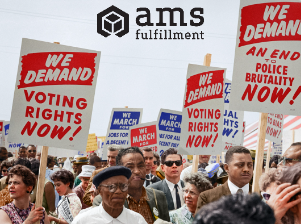
Most of us see the Civil Rights Act of 1964 as the one affecting the right to vote and forbidding discrimination on the basis of sex, as well as race in hiring, promoting, and firing. The 1964 Act strengthened the enforcement of voting rights and the desegregation of schools. What did the Civil Rights Act of 1957 do?
The Civil Rights Act of 1957 protected voting rights and established the Civil Rights Division of the US Department of Justice. It was President Dwight Eisenhower who signed the Bill. Interesting to note that this was the first civil rights legislation since Reconstruction, which would have been the Civil Rights Act of 1871.
We asked Google, what was the reason for the Civil Rights Act of 1957. “Partly in an effort to defuse calls for more far-reaching reforms, President Eisenhower proposed a civil rights bill that would increase the protection of African American voting rights. By 1957, only about 20% of black people were registered to vote.”
What did the Civil Rights Act of 1957 prohibit? It made it clear that no one was allowed to threaten or coerce or attempt to intimidate or interfere with the right of others to vote.
Now that we have glimpsed the historical journey of voting rights, let’s look at the non-discrimination rights. “Title VII is a provision of the Civil Rights Act of 1964 which prohibits discrimination in virtually every employment circumstance on the basis of race, color, religion, gender, pregnancy, or national origin. In general, Title VII applies to employers with 15 or more employees.”
So there we have it – the ongoing journey of human beings becoming more human.
AMS Fulfillment joined this ‘higher standards’ journey upon its establishment more than 20 years ago. We became a B Corporation seven years ago because it fit for us – we very much appreciate the requirements set by the B the Change organization toward fairness and a just and equitable world.
Non-discrimination was written into law in 1957 and 1964 and law goes part of the way. The rest of the way has to do with realizing that by applying a higher standard, a negative can become a positive.
The B Corporation says, we want Diversity in our workforce as that makes for a stronger and better, and happier workforce. We want Equity in our hiring, promotion and business practices because equity is simply being fair and impartial. Thirdly, the B Corporation says, we want Inclusion. What could inclusion mean other than we want to include rather than exclude, and we take steps to do so.
Diversity, Equity and Inclusion is referred to as DE&I. AMS has added another word – Justice. JEDI: Justice, Equity, Diversity and Inclusion. What does JEDI mean? It means what it says… we want a just world, where things are fair, no one is discriminated against, and where we include all who want to be included. We want to B the Change.
In 2023 we are able to look back and see the gradual changes in the American culture, politics, education and businesses over the years. We are so grateful to see the shifting of the culture, moving from inhumanity to human respect. Of course at AMS we celebrate the Civil Rights Act of 1957. It was a step in the right direction and there was progress achieved because of it. And the progress continued as the people marched and lobbied and required change!
The Library of Congress website offers information from the time period: “The NAACP’s legal strategy against segregated education culminated in the 1954 Supreme Court’s landmark Brown v. Board of Education decision. African Americans gained the formal, if not the practical, right to study alongside their white peers in primary and secondary schools. The decision fueled an intransigent, violent resistance during which Southern states used a variety of tactics to evade the law.”
You can read the full article HERE:
Let’s be the change we wish to see in the world and start where we are.



